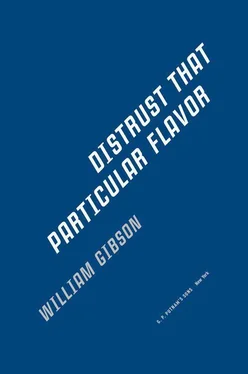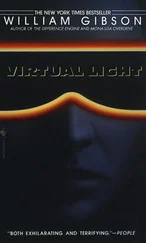Fast-forward to a vast, freezing, dilapidated factory building on the outskirts of Toronto, in which has been constructed a segment of my dystopian near-future Newark, an aerial shantytown slung beneath a bridge. Here, amid cameras and crew and the patchwork of our junkyard set, I watch Takeshi prepare to portray my Yakuza boss.
I’m terrified. I’ve only just seen, for the first time, the day before, actors portraying characters I’ve written. And now Takeshi strikes me as a tulpa , a materialized thought-form, sentient plasm of whatever cross-cultural meme generated this character through me. I don’t believe he’s acting. As if to reinforce this, his entourage of smooth-faced, unblinking young associates dress as if in imitation of his character’s costume. Or, rather, as if they had no need for imitation, being already there. Like the character, they are all buttoned into beautifully cut cashmere overcoats. Black.
I never saw Takeshi again, and then, months later, I heard that he had been terribly injured in a motorcycle accident, and was at first not expected to live, and then, when he did live, was not expected to be able to act again.
It made me very sad.
I thought of all this, this past summer, as I watched his film Brother in the Vancouver Film Festival, one of the only films I’ve seen which captures the micron-thin veneer of city-over-desert that one sees constantly in the parts of Los Angeles one never sees in films. Takeshi had survived his motorcycle crash, with the newly limited mobility of his features turned to full advantage as he takes us on his character’s somberly delirious kamikaze run into a simpler and more hauntingly realized vision of night-side America than our own directors have given us for quite a long time.
Toughness has been rather out of fashion, as a masculine virtue, and Takeshi simultaneously radiates it and suggests its wounded core. There can in fact be no depiction of genuine toughness (not brutality but a sort of excess of substance, of soul-stuff) without this concomitant indication of that wound, else the piece becomes simply the pornography of fascism.
Takeshi is simultaneously tougher and more wounded than you or I will ever be. Given the ever deeper and more precise reach of the spectral hand of marketing, I suspect that he’s tougher and more wounded than any Hollywood star is ever likely to be allowed to be.

When I wrote this, I hadn’t yet realized that Bruce Sterling, when he spoke of translations, was paraphrasing Jorge Luis Borges.
If you’d like to see a Takeshi Kitano film, I recommend Sonatine.
Johnny Mnemonic, as cut for the film’s Japanese release, is some minutes longer, all of that in the service of delivering more Takeshi Kitano, and is of course the better for it.

Talk for Book Expo, New York

SAY IT’S MIDWAY through the final year of the first decade of the twenty-first century. Say that, last week, two things happened: Scientists in China announced successful quantum teleportation over a distance of ten miles, while other scientists, in Maryland, announced the creation of an artificial, self-replicating genome. In this particular version of the twenty-first century, which happens to be the one you’re living in, neither of these stories attracted a very great deal of attention.
In quantum teleportation, no matter is transferred, but information may be conveyed across a distance, without resorting to a signal in any traditional sense. Still, it’s the word “teleportation,” used seriously, in a headline. My “no kidding” module was activated: “No kidding,” I said to myself, “teleportation.” A slight amazement.
The synthetic genome, arguably artificial life, was somehow less amazing. The sort of thing one feels might already have been achieved, somehow. Triggering the “Oh, yeah” module. “Artificial life? Oh, yeah.”
Though these scientists also inserted a line of James Joyce’s prose into their genome. That triggers a sense of the surreal, in me at least. They did it to incorporate a yardstick for the ongoing measurement of mutation. So James Joyce’s prose is now being very slowly pummeled into incoherence by cosmic rays.
Noting these two pieces of more or less simultaneous news, I also noted that my imagination, which grew up on countless popular imaginings of exactly this sort of thing, could produce nothing better in response than a tabloid headline: SYNTHETIC BACTERIA IN QUANTUM FREE-SPACE TELEPORTATION SHOCKER.
Alvin Toffler warned us about Future Shock, but is this Future Fatigue? For the past decade or so, the only critics of science fiction I pay any attention to, all three of them, have been slyly declaring that the Future is over. I wouldn’t blame anyone for assuming that this is akin to the declaration that history was over, and just as silly. But really I think they’re talking about the capital-F Future, which in my lifetime has been a cult, if not a religion. People my age are products of the culture of the capital-F Future. The younger you are, the less you are a product of that. If you’re fifteen or so, today, I suspect that you inhabit a sort of endless digital Now, a state of atemporality enabled by our increasingly efficient communal prosthetic memory. I also suspect that you don’t know it, because, as anthropologists tell us, one cannot know one’s own culture.
The Future, capital-F, be it crystalline city on the hill or radioactive postnuclear wasteland, is gone. Ahead of us, there is merely… more stuff. Events. Some tending to the crystalline, some to the wasteland-y. Stuff: the mixed bag of the quotidian.
Please don’t mistake this for one of those “after us, the deluge” moments on my part. I’ve always found those appalling, and most particularly when uttered by aging futurists, who of all people should know better. This newfound state of No Future is, in my opinion, a very good thing. It indicates a kind of maturity, an understanding that every future is someone else’s past, every present someone else’s future. Upon arriving in the capital-F Future, we discover it, invariably, to be the lower-case now.
The best science fiction has always known that, but it was a sort of cultural secret. When I began to write fiction, at the very end of the Seventies, I was fortunate to have been taught, as an undergraduate, that imaginary futures are always, regardless of what the authors might think, about the day in which they’re written. Orwell knew it, writing Nineteen Eighty-Four in 1948, and I knew it writing Neuromancer , my first novel, which was published in 1984.
Neuromancer , though it’s careful never to admit it, is set in the 2030s, when there’s something like the Internet, but called “cyberspace,” and a complete absence of cell phones, which I’m sure young readers assume must be a key plot-point. More accurately, there’s something like cyberspace, but called “cyberspace,” but that gets confusing. I followed Neuromancer with two more novels set in that particular future, but by then I was growing frustrated with the capital-F Future. I knew that those books were actually about the 1980s, when they were written, but almost nobody else seemed to see that.
Читать дальше












